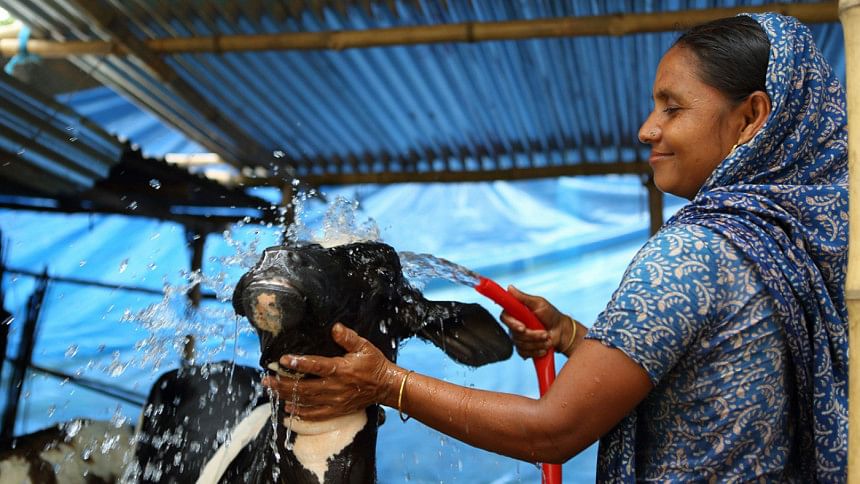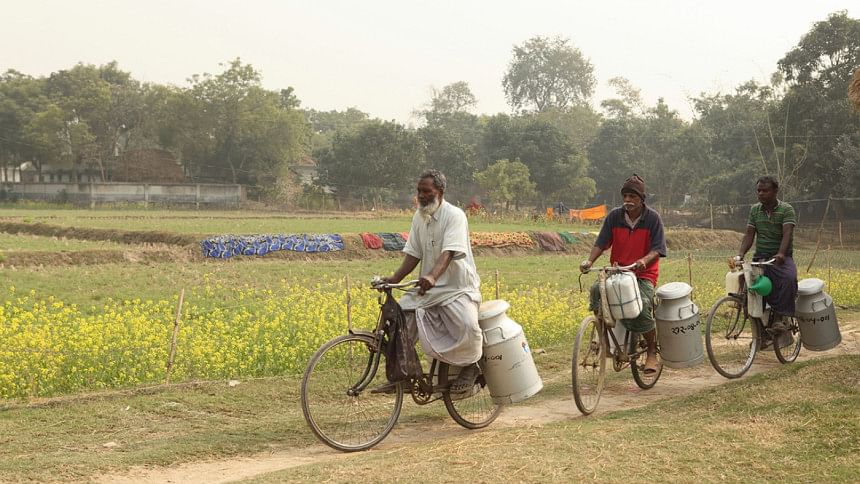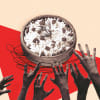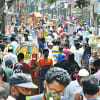Future of food security: How social enterprises are keeping up during Covid-19

When the shutdown in Bangladesh was announced on March 23, agricultural activities were not included in the closure.
"This was because otherwise, 17 crore people would not have food to eat," says Mohammad Anisur Rahman, director of Brac Social Enterprises. "The government decided that the agricultural sector was to continue as usual."
But now as similar lockdowns in exporting-countries are being prolonged, fears have begun to grow about a possible food crisis.
Anything that is perishable will take a hit. Dairy, poultry, fisheries and vegetables have short-shelf lives. Growers of summer vegetables have been affected particularly hard.
In these times, social enterprises are looking towards innovative solutions and working within the new reality of the world.
Although most of Brac's offices have been closed, its social enterprises continued to operate. One reason for this was to ensure food security, aligned with the government's directives. Another was the people the enterprises are connected with. "Their livelihoods would have been at stake had we suddenly pulled out," says Anisur.
Operating during the shutdown, however, was not easy.
"Our primary concern was the safety of our staff and partners. Every single employee was equipped with hygiene materials such as soap, masks and gloves. All offices, distribution points, collection centres, hatcheries and nurseries had handwashing and disinfectants stations, physical distance markings and thermal screening at the entrances. Efforts went into making farmers more aware about Covid-19 and safety and hygiene measures, through communication materials such as leaflets," he said.
AN IMPENDING FOOD CRISIS?
"Sowing for kharif [autumn] crops is done. We have placed the order for the winter crops season, which starts in October. If the lockdowns in exporting countries do not ease up by the end of June, we will be looking at an insufficient supply of imported seeds. A switch to local varieties will be possible, but due to low yield, it may not be able to accommodate more than one season, and the resulting impact would be shortage of food," Anisur said.
One-third of the country's commercial farmers did not cultivate fish in their empty ponds. The impact of this will be seen in three to four months, during the harvesting period, when there will be a short supply of fish.
"I see a shortage in supply of chemicals and packaging raw materials. Our Printing Pack enterprise used to bring its raw materials from India, Malaysia, China and Thailand, so there has been a lag there, due to the lockdowns. Chemicals for fisheries used to come from India and Thailand.
"The shortage in supply of raw materials and packaging materials means that the quality is going down and prices are going up," Anisur observed.
A prolonged lockdown in the region also means the agricultural sector receives blows from both micro and macro sides. "We are looking at a reduction in demand and consumption. If farmers do not get their return on investment, they will not have adequate investment for the next crop cycle," he said.
Complicating matters further, Anisur said farmers also rely on remittances for investments, which are not coming in as much. This, on the other hand, will have an impact on food security, and inflation will rise as the country heads towards a possible overall economic slowdown.
Going forward, he stressed the need to adjust to a new normal. For Brac's social enterprises, this could mean that areas with less impacts may have to shut down if there is a lockdown for a prolonged period of time. "Operations might be slimmed, but cannot come to a halt. As social enterprises, we have to prioritise."
Brac's social enterprises plan to continue all the agri-based operations. "We are currently figuring out what changes to bring so that the artisans and farmers we work with can retain their livelihoods."
The enterprises utilise purpose-driven strategies to lift people up economically. "At the heart of a social enterprise, we look after our farmers. Most have no alternative income. We have a commitment to them and their livelihoods, which can falter as a result of our action. That is counterproductive to our values as a social enterprise," he added.
MILK FOR GOOD: SUPPORTING THE MOST PERISHABLE INDUSTRY
Keeping enterprises afloat during a global pandemic comes with costs. "The dairy industry was instantly affected. Fisheries and poultry were also hit, but with these industries, delayed harvest is a possibility. Dairy is extremely perishable. Farmers have to sell the milk on the very day they get it," Anisur said.

About 28,000 contractual farmers are connected with Aarong Dairy. The enterprise collects milk from them and connects them with various services to improve breeds as well as veterinary services, treatment support, nutrition advice and safekeeping of milk.
Aarong Dairy's sales plummeted by 50% as a result of closure of sales points such as stores, restaurants, sweet shops and community centres. However, they continued to collect milk from their contractual farmers, converting some of the collections into powdered milk and the rest as UHT milk.
Other farmers across the country who were not connected with Aarong Dairy were throwing out their milk, as the stores they normally sold to had closed. Aarong Dairy assessed its capacity and started buying milk from them at the same rate they pay their contractual farmers. "We collected additional 40,000 litres of milk per day from these affected farmers. Despite our low sales, we continued this support to about 5,000 farmers," recalled Anisur.
Two issues arose. The warehouses were running out of space and uncertainty was looming. "Will we be able to sell the stock we already have? We eventually had to discontinue buying from external farmers after two weeks, but continued to collect milk from our contractual farmers."
There are risks if stocks are not sold -- money is held up and interest accumulates in the bank. With sales already low and continued closure of establishments throughout the country, there is a high risk of dairy products going bad.
But this is a risk Aarong Dairy has been willing to take.
"If we stopped collecting milk, it would greatly affect the farmers," Anisur said. There has been no change in the buying and selling rate of Aarong Dairy's products from before. Profitability is currently being ignored. Extra costs are being absorbed and will not be transferred to customers.
"As social enterprises, we provide a service to our farmers and a commitment to customers, regardless of the financial inconvenience."
Anisur assures that it is not all chaos. Changes in people's consumption patterns allow for some balances.
"With Aarong Dairy, we have high value products, with high margins which normally do not sell a lot."
Think canned sweets and packaged cheese -- products which have comparatively higher margin. In Bangladesh, customers usually buy these from places like the neighbourhood sweet shops. "The demand for these has gone up, since most small stores and sweet shops have shut down. The safety measures also meant that people were not going out, so we decided to pilot a delivery service which has been well received. Within two weeks, we made 3,000 deliveries."
OPPORTUNITIES IN CRISES
Innovations, like the delivery service, are continuing to take place.
Distribution points for the seed and agro enterprise were expanded by utilising sales points and dealer points as distribution hubs. The artificial insemination enterprise kept its sales center operations open for only for two hours a week from 9am to 11am, to keep exposure to the virus low but keep performance at the same level. Operational efficiency came in as work days had to be shrunk due to government orders, with staggered schedules from 6am to 12pm. "What our sales teams used to do in a twelve-hours span, they now get done in less than half that time."
Anisur sees Aarong Dairy as a hopeful sign that with innovations and persistence, social enterprises can continue to operate and make a difference. "People need nutritious food. Consumers were looking to buy dairy products, so we ensured that was possible by introducing home deliveries."
During this unprecedented global crisis, keeping day-to-day operations alive itself is a challenge, so allocating resources for large-scale innovations may not be a feasible option for many organisations. Anisur's advice: Businesses should be looking out for small innovations within themselves.
"They have to look inside their own mechanisms. How do products and services normally get to consumers' hands? What can they do differently, to work around the shutdown and still can reach out to consumers? We must identify solutions that are unique for our businesses."
These innovations need to be kept up going forward, as the region continues to navigate the loosening of lockdowns. Anisur anticipates some supply shocks in Bangladesh, particularly in seeds, perishables and raw materials.
Luba Khalili is Deputy Manager, BRAC Communications. Ramim Hasan of BRAC Communications has contributed to this report.










Comments